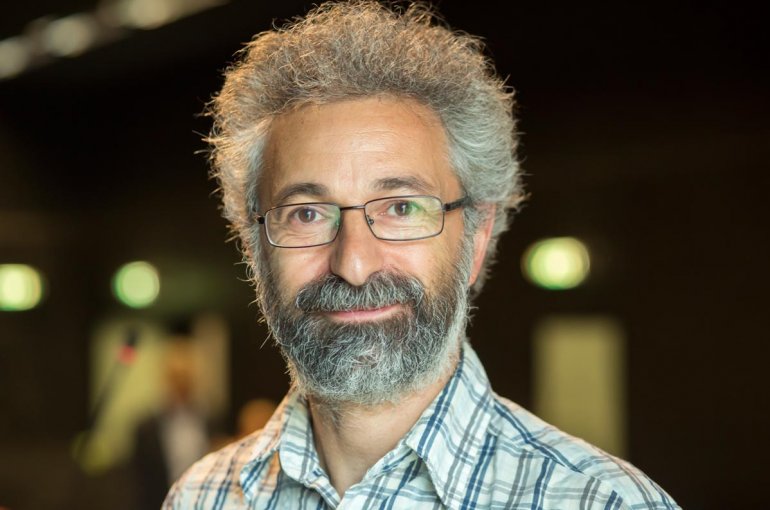Professor Jaboury Ghazoul of ETH Zürich new professor of Prince Bernhard Chair

Since July 2015, Professor Jaboury Ghazoul, Professor of Ecosystem Management from ETH Zürich, is the new professor of the Prince Bernhard Chair for International Nature Conservation of Utrecht University. In October he gave his first workshop, Scientific Writing’, in Utrecht. He wants his students to write an article “that makes people sit up”, because, he stresses, as an academic they have to consider how to make an impact. His aim: an integrated interdisciplinary approach to address big environmental issues successfully from the perspective of ‘Ecosystem Services’.
Although the Prince Bernhard Chair is only a 0,2 fte position for 5 years, Prof. Jaboury Ghazoul was one of no less than 32 applicants for it. “I already knew of the chair, several previous chair holders are friends of mine, and it sounded really exciting to me. As an academic I always have a craving for new ideas, for bringing together new complementarities and skills in collaborations and projects. Also I love to engage students. The Prince Bernhard Chair is a great opportunity for doing all of this.”
Ecosystem Services
Ghazoul’s focus in research and teaching is the concept of ‘Ecosystem Services’, by which is meant all the different ways humankind benefits from ecosystems. The difficulty with Ecosystem Services is that in case of changes of land use, many different interests are involved. “Take the current issue of tropical rain forests being replaced by oil palm plantations. This has social, agricultural, economic, ecological and probably also political drivers and consequences. I don’t have expertise in all these disciplines. So I try to initiate research projects that engage the local communities and other stakeholders, as well as scientists with expertise in economics, governance, social science, ecology and biodiversity and so on”, he explains.
Overcoming conflicts
The scientists working together with local stakeholders define the outcomes they want to deliver and design and explore pathways to get there. “We want to study different scenarios of change towards more sustainable futures. By bringing scientists and local stakeholders together, we can explore how to overcome conflicts using both scientific knowledge and local information about the effects of certain choices on the several interests involved.”
Restoring ‘degraded’ forest land
One of the projects he would like to take up concerns the problem of so called ‘degraded’ forest land, and its rehabilitation and restoration. That is a topical issue in Indonesia, where big fires burn away hundreds of square kilometers of rain forest every day. “I would like to see a future in which not only are environmentally destructive activities halted, but also a future where conservationists, land managers and policy makers are working together to recover and restore healthy forests on the extensive areas of degraded land that now exists across the region. We need to bring together diverse expertises and stakeholders. We need to ask why are people setting fires, and with what purpose? How do climate change and land use interact to affect forest degradation by fire or other means? Who are the winners and who are the losers? What are the challenges and costs to restoring the rain forest? ”
Teaching by being a facilitator
Ghazoul also enjoys teaching. When he applied he presented the committee with several courses and lectures he had in mind already. “My approach is not unique, but I believe it is different from that used in many universities. I see myself as a facilitator. Many students have a lot more knowledge and skills than they are aware of, but they need to be taught how to effectively use their knowledge and skills. By letting them discuss, debate, write, I make them think a little more deeply in themselves and enhance their understanding of the field.”
Jaboury Ghazoul
Jaboury Ghazoul (1967) graduated in Marine and Environmental Biology at the University of St Andrews, Scotland. He took his PhD in Evolutionary Ecology at the same university. After a year of working in Vietnam as scientific coordinator for Environmental Exploration, and a three year postdoc with CIFOR and the Natural History Museum in London, he got a position as lecturer and later senior lecturer at the Imperial College London. In 2005 he was appointed Professor of Ecosystem Management at the ETH Zürich.
Prince Bernhard Chair
The Prince Bernhard Chair for International Nature Conservation is a special chair embedded within the Ecology & Biodiversity research group at the department of Biology of the Faculty of Science. It was founded in 1987 at the occasion of the 75th anniversary of His Royal Highness Prince Bernhard (1911-2004) in honour of his crucial role in international nature conservation. Prince Bernhard was founder and first president of WWF (World Wildlife Fund) and initiated the Peace Park Foundation. In the Netherlands, the Prince was President of the Dutch WWF for over 30 years. Until his death in 2004, Prince Bernhard was closely involved with the activities of his Chair at Utrecht University.
Linking conservation science and practice
The Chair has since its establishment strongly contributed to linking conservation science and practice. It has done so by (1) training Dutch and international students (BSc, MSc and PhD) in international aspects of nature conservation, (2) driving science-based international conservation efforts, and (3) raising awareness of pressing conservation issues. Prince Bernhard Chair holders are internationally renowned researchers working at the interface of science and conservation. Former chair holders are Norman Meyers (1987-1992), Jeffrey Sayer (1994-2003), Jack Putz (2004-2009) and Bill Laurance (2010-2014). Chair holders serve for a term of five years (0,2 fte) during which they visit Utrecht University for at least one month per year, often distributed over several visits.
>> Website Prince Bernhard Chair
Sustainability
The Prince Bernhard Chair is part of the research and education of 'Water, Climate and Ecosystems', that belongs to Utrecht University’s strategic theme Sustainability.

